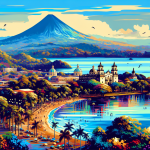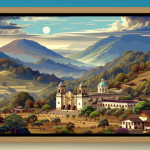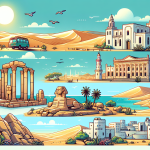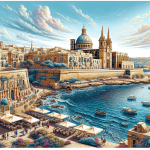Discovering Sudan: A Hidden Gem in Africa
Sudan, often overshadowed by its more famous neighbors, offers travelers a unique blend of natural beauty, rich history, and vibrant culture. From the ancient pyramids of Meroë to the bustling streets of Khartoum, Sudan is a country waiting to be explored. This guide will take you on a journey through Sudan’s most captivating destinations, uncovering the hidden treasures and untold stories of this fascinating land. Whether you’re an adventure seeker, a history buff, or simply looking to experience something new, Sudan has something to offer. Dive into the diverse landscapes, meet the warm and welcoming people, and immerse yourself in the cultural tapestry that makes Sudan a hidden gem in Africa.
Exploring Khartoum: The Heartbeat of Sudan
Khartoum, the capital city of Sudan, is a vibrant metropolis where the Blue and White Nile rivers converge. This bustling city is a melting pot of cultures, offering a unique blend of modernity and tradition. Start your journey at the National Museum of Sudan, which houses an extensive collection of artifacts dating back to the ancient Kingdom of Kush. The museum provides a comprehensive overview of Sudan’s rich history, from prehistoric times to the present day. Don’t miss the Mahdi’s Tomb, a significant historical site that offers a glimpse into Sudan’s past struggles and triumphs.
Omdurman: A Historical Treasure Trove
Located just across the Nile from Khartoum, Omdurman is Sudan’s largest city and a historical treasure trove. The Omdurman Souq is one of the largest markets in Africa, offering everything from traditional crafts to modern goods. Wander through the bustling stalls, and you’ll find everything from spices and textiles to jewelry and pottery. The Khalifa House Museum is another must-visit, showcasing artifacts from the Mahdist War and offering insights into Sudan’s colonial past.
Khartoum’s Cultural Scene
Khartoum is also a cultural hub, with numerous galleries, theaters, and cultural centers. The Sudan National Theatre hosts regular performances, ranging from traditional Sudanese music and dance to contemporary plays. The Afra Mall, one of the largest shopping centers in Khartoum, offers a mix of local and international brands, along with a range of dining options. For a more traditional experience, visit the Hamed al-Nil Tomb on a Friday evening to witness the mesmerizing Sufi whirling dervishes.
The Ancient Pyramids of Meroë
No visit to Sudan would be complete without exploring the ancient pyramids of Meroë. Located about 200 kilometers north of Khartoum, Meroë was the capital of the Kingdom of Kush and is home to over 200 pyramids. Unlike the famous pyramids of Egypt, the pyramids of Meroë are smaller and steeper, but no less impressive. These ancient structures are a testament to the advanced engineering skills of the Kushite civilization and offer a fascinating glimpse into Sudan’s ancient past.
Exploring the Meroë Pyramids
Visitors to Meroë can explore the pyramids up close, marveling at the intricate carvings and hieroglyphs that adorn these ancient tombs. The Royal Cemetery, home to the most well-preserved pyramids, is a highlight of any visit. For a truly unforgettable experience, consider taking a guided tour to learn more about the history and significance of this ancient site. The nearby Meroë Museum offers additional insights, with exhibits showcasing artifacts excavated from the site.
Camping in the Desert
For those seeking a more adventurous experience, consider camping in the desert near the Meroë pyramids. Several tour operators offer overnight camping trips, complete with traditional Sudanese meals and the opportunity to stargaze under the clear desert skies. This unique experience allows you to fully immerse yourself in the history and beauty of the Meroë pyramids, providing a deeper appreciation for this ancient wonder.
The Nubian Villages of Northern Sudan
Traveling further north, you’ll find the picturesque Nubian villages along the banks of the Nile. The Nubian people have a rich cultural heritage, and their villages are known for their brightly painted houses and warm hospitality. As you wander through these charming villages, you’ll be greeted with smiles and invitations to share a cup of tea or a meal. The Nubian people are proud of their traditions, and many are eager to share stories and customs with visitors.
Exploring Nubian Architecture
Nubian architecture is characterized by its distinctive style, with brightly painted houses adorned with intricate patterns and designs. Many of the houses are built using traditional methods, with mud bricks and thatched roofs. The vibrant colors and unique designs make these villages a photographer’s paradise. Take the time to explore the narrow streets and alleys, and you’ll discover hidden gems around every corner.
Experiencing Nubian Culture
The Nubian people have a rich cultural heritage, and there are many opportunities to experience their traditions firsthand. Attend a traditional Nubian music and dance performance, or participate in a cooking class to learn how to prepare traditional dishes. The Nubian people are known for their hospitality, and you’re likely to be invited into homes to share a meal or a cup of tea. These interactions provide a deeper understanding and appreciation of Nubian culture and way of life.
The Red Sea Coast: A Diver’s Paradise
The Red Sea coast of Sudan is a hidden gem for diving enthusiasts. With its crystal-clear waters, vibrant coral reefs, and diverse marine life, this stretch of coastline offers some of the best diving in the world. The pristine reefs are home to a wide variety of marine species, including colorful fish, sharks, and rays. The lack of mass tourism means that the dive sites are relatively untouched, offering a truly unique and unspoiled underwater experience.
Top Dive Sites
Some of the top dive sites along the Red Sea coast include Sanganeb Reef, Shaab Rumi, and the Umbria Wreck. Sanganeb Reef is a marine park and UNESCO World Heritage Site, known for its stunning coral formations and diverse marine life. Shaab Rumi is famous for its shark encounters, with frequent sightings of hammerhead sharks, reef sharks, and occasionally, whale sharks. The Umbria Wreck is a sunken Italian cargo ship, offering an exciting and challenging dive for experienced divers.
Dive Resorts and Liveaboards
There are several dive resorts and liveaboard operators along the Red Sea coast, catering to divers of all levels. These operators offer a range of packages, from single-day dives to week-long liveaboard trips. Many of the resorts are located in Port Sudan, the main gateway to the Red Sea coast. The liveaboard trips offer the opportunity to explore remote and pristine dive sites, with comfortable accommodations and expert guides to ensure a safe and enjoyable experience.
The Stunning Landscapes of Jebel Barkal
Jebel Barkal, a UNESCO World Heritage Site, is a stunning natural and cultural landmark in Sudan. This small mountain, located near the town of Karima, has been a sacred site for centuries. The ancient Egyptians and later the Kushites believed that Jebel Barkal was the dwelling place of the god Amun, and the mountain is surrounded by numerous temples and pyramids. The site offers breathtaking views of the surrounding desert landscape and the Nile River.
Exploring the Temples and Pyramids
The temples and pyramids around Jebel Barkal are some of the most well-preserved ancient structures in Sudan. The Temple of Amun, located at the foot of the mountain, is the largest and most impressive of these structures. The temple complex includes several smaller temples and chapels, as well as numerous statues and reliefs. The nearby pyramids, part of the Nuri and El-Kurru necropolises, offer additional opportunities for exploration and discovery.
Hiking and Climbing Jebel Barkal
For those seeking adventure, hiking and climbing Jebel Barkal is a must-do activity. The climb to the summit is relatively easy and offers stunning panoramic views of the surrounding landscape. The best time to climb is early in the morning or late in the afternoon, when the temperatures are cooler, and the light is perfect for photography. As you make your way to the top, you’ll pass by ancient carvings and inscriptions, adding to the sense of history and wonder.
The Rich Cultural Heritage of Sudan
Sudan’s rich cultural heritage is evident in its diverse traditions, languages, and customs. The country is home to more than 500 ethnic groups, each with its own unique culture and traditions. This diversity is reflected in Sudan’s music, dance, art, and cuisine. Traditional Sudanese music is characterized by its rhythmic beats and melodic tunes, often accompanied by dancing and drumming. The country’s art scene is also thriving, with numerous galleries and cultural centers showcasing the works of local artists.
Cultural Festivals and Events
Sudan hosts numerous cultural festivals and events throughout the year, celebrating the country’s rich heritage and traditions. The Khartoum International Music and Dance Festival, held annually in Khartoum, features performances by local and international artists, showcasing a wide range of musical styles and genres. The Nubian Festival, held in the Nubian villages along the Nile, celebrates Nubian culture with traditional music, dance, and food. These festivals offer a unique opportunity to experience Sudan’s cultural diversity and connect with local communities.
Traditional Sudanese Cuisine
Sudanese cuisine is a reflection of the country’s diverse cultural heritage, with influences from Arab, African, and Mediterranean cuisines. Some of the most popular dishes include **ful medames**, a savory stew made from fava beans, and **kisra**, a type of flatbread made from fermented sorghum flour. Another must-try dish is **aseeda**, a thick porridge made from wheat or sorghum, often served with a meat or vegetable stew. For dessert, try **basbousa**, a sweet semolina cake soaked in syrup. Sudanese cuisine is known for its bold flavors and generous use of spices, making it a culinary delight for food lovers.
Practical Tips for Traveling to Sudan
Before embarking on your journey to Sudan, it’s important to be well-prepared and informed. Here are some practical tips to help you make the most of your trip:
Visa and Entry Requirements
Most travelers to Sudan will need a visa, which can be obtained from a Sudanese embassy or consulate. It’s important to check the specific requirements for your nationality, as these can vary. In addition to a visa, you’ll need a valid passport with at least six months of validity remaining. It’s also recommended to have a copy of your travel itinerary and accommodation details on hand when entering the country.
Health and Safety
Before traveling to Sudan, it’s important to check the latest health and safety advice from your government or a reputable travel advisory service. Ensure that you have the necessary vaccinations and take precautions to avoid mosquito bites, as malaria is prevalent in some areas. It’s also a good idea to carry a basic first aid kit and any necessary medications with you. While Sudan is generally a safe country to visit, it’s important to stay informed about the current situation and follow local advice and guidelines.
Currency and Payments
The official currency of Sudan is the Sudanese pound (SDG). While credit cards are accepted at some hotels and larger establishments in Khartoum, it’s best to carry cash for most transactions, especially in smaller towns and rural areas. ATMs are available in major cities, but they may not always be reliable, so it’s a good idea to have some cash on hand. It’s also worth noting that foreign currency, particularly US dollars, is widely accepted and can be exchanged at banks and exchange bureaus.
Language and Communication
Arabic is the official language of Sudan, and English is widely spoken, especially in major cities and tourist areas. Learning a few basic Arabic phrases can go a long way in enhancing your travel experience and helping you connect with locals. Internet access is available in most hotels and cafes in Khartoum, but it may be limited or unavailable in more remote areas. It’s a good idea to have a local SIM card or an international roaming plan to stay connected during your trip.
Final Thoughts: Embracing the Adventure
Sudan is a destination that offers a wealth of experiences for the intrepid traveler. From the ancient pyramids of Meroë to the vibrant streets of Khartoum, from the serene Nubian villages to the stunning Red Sea coast, Sudan is a country that promises adventure, discovery, and a deep connection with its rich history and culture. As you explore this fascinating land, you’ll be welcomed by the warmth and hospitality of the Sudanese people, who are eager to share their stories and traditions with visitors. Embrace the adventure, and you’ll leave Sudan with memories that will last a lifetime.
For more information on travel tips and destinations, visit Lonely Planet.







